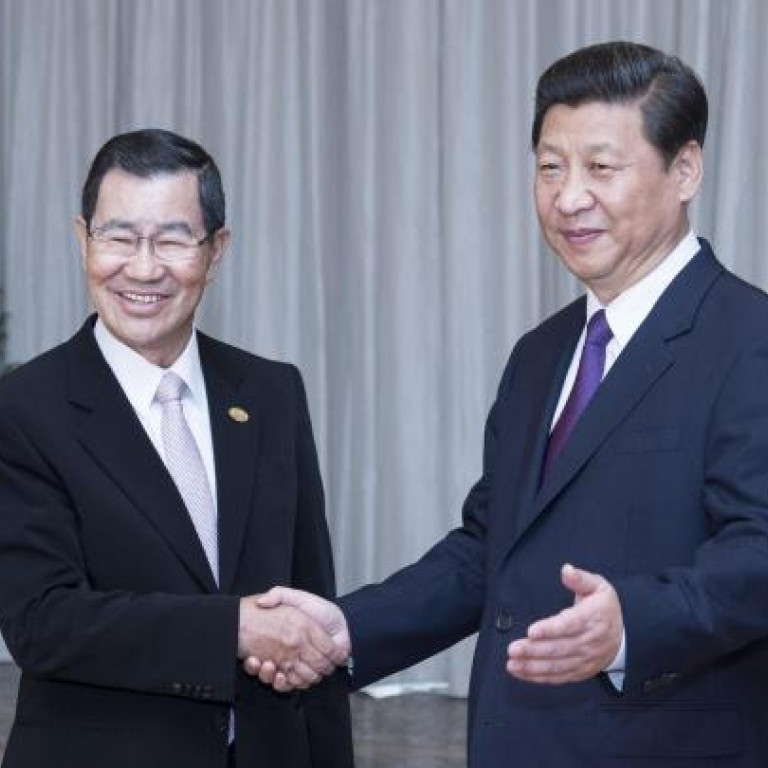
Different responses to Siew and Lien trips reveal Ma's thinking
Hailing of one, shunning of other after their visits to mainland reflect strategy of developing trade relations while eschewing political talks
Taiwanese authorities reacted positively to a landmark meeting between the island's former vice-president, Vincent Siew Wan-chang, and new top mainland leader Xi Jinping on the sidelines of the Boao Forum for Asia in Hainan on Monday.
That contrasted with the cautious way they greeted a meeting between Xi and the honorary chairman of the Kuomintang, Lien Chan, in Beijing in February. The divergence reflected the Taiwanese leader's reluctance to begin political dialogue with the mainland even as Beijing and Lien push for it.
The Mainland Affairs Council, in charge of Taiwanese policies towards the mainland, described the Siew-Xi meeting as "advantageous to the positive development of cross-strait relations", and the island's economics ministry praised it as being "practical" and "in line with Taiwan's need for external economic development".
Taiwanese President Ma Ying-jeou hailed Siew for his long-standing efforts in promoting Taiwan's economic exchanges with the mainland and international society. Ma also commended his work to express the island's desire to sign pacts on services co-operation and trade dispute settlement with the mainland under the Economic Co-operation Framework Agreement (ECFA) signed by the two sides in 2010.
In his capacity as the founder and honorary chairman of the Taipei-based Cross-Strait Common Market Foundation, Siew met Xi on Monday in Boao, after Xi succeeded Hu Jintao as president last month. Siew met Hu at the Boao forum in 2008 in his capacity as Taiwan's vice-president-elect in what was described as a historic meeting.
In Monday's talks, Siew proposed a three-point vision for further economic co-operation, including jointly addressing the issues of rapid economic integration in the Asia-Pacific region and Taiwan's participation in regional trade blocs in a reasonable and fair manner.
He emphasised Taiwan's wish to participate in regional economic integration.
In response, Xi said he would continue the current policy of peaceful development of cross-strait ties, and that because people from both sides belonged to the same Chinese race and were from the same family, the mainland would truly consider the needs of Taiwanese compatriots and help their economy prosper.
While Xi repeatedly emphasised the racial connection, Siew focused mainly on Taiwan's economic needs and its desire to be part of regional economic blocs and for completion of the ECFA follow-up talks. That is the focus the Ma government wants and that explains why Siew was greeted with praise when he returned home, unlike the denial that greeted Lien on his return.
Xi invited Lien to meet him in late February, shortly before he succeeded Hu as mainland president. The meeting was considered significant because it showed the cross-strait policy of the new mainland leader.
Eight years ago, when he was KMT chairman, Lien made history with an ice-breaking trip to Beijing during which he met Hu. That meeting paved the way for the resumption of talks between Taiwan and the mainland.
Even after Ma became president in 2008 and KMT chairman the following year, Lien remained the key person in cross-strait political communication. Echoing Xi's call for political dialogue, Lien said in his meeting with Xi that such talks were inevitable.
Even though political dialogue is a logical step if the two sides are to continue the peaceful development of their relationship, Lien's comments were criticised by Taiwan's pro-independence camp.
And Ma's office even issued a statement denying that Ma had asked Lien to relay the message to Xi, saying Lien had met Xi in his private capacity.
Citing the fear the majority of the island's people have of cross-strait unification, the Ma government has said it has no plan to deal with the issue any time soon.
But ready or not, Taiwan will have to face the reality of political dialogue with the mainland, because the island has become increasingly reliant on the mainland economy. The more generous Beijing is in satisfying Taiwan's economic needs, the harder it will be for the island to resist political dialogue.

